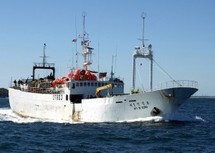
WELLINGTON, mardi 14 décembre 2010 (Flash d'Océanie) – Le centre néo-zélandais de secours en mer de Nouvelle-Zélande a estimé lundi en fin de journée que les chances de retrouver des survivants supplémentaires parmi l’équipage d’un chalutier sud-coréen qui a sombré lundi au Sud du pays, en Antarctique, étaient désormais quasiment nulles.
Le chalutier coréen « In Sung n°1 », bâtiment de plus de six cent tonnes, a coulé lundi, pour une raison non encore déterminée, à environ mille huit cent kilomètres au Nord de la base Scott néo-zélandaise en Antarctique.
Depuis, les recherches maritimes et aériennes civiles et militaires mobilisées ont permis de retrouver cinq corps, les dix sept autres passagers étant toujours portés disparus, sans grand espoir d’en retrouver aucun vivant.
Vingt autres ont pu être rapidement repêchés par un des trois navires coréens qui s’étaient déroutés pour porter assistance.
L’équipage de ce chalutier était composé de ressortissants sud-coréens, chinois, indonésiens, vietnamiens, philippins et russes, a précisé l’armement.
Ramon Davis, qui coordonne ces opérations pour le compte de Maritime New Zealand, a froidement souligné dès lundi que les eaux dans cette région étaient glaciales et ne dépassaient pas les deux degrés Celsius.
« Dans ces conditions, le temps de survie ne dépasse généralement pas les dix minutes », a-t-il expliqué.
Les recherches se sont poursuivies dans la nuit de lundi à mardi, mais les moyens déployés avaient déjà été réduits.
L’enquête sur les causes de ce naufrage subi, qui n’a pas laissé le temps d’activer la balise de détresse, semble privilégier la thèse d’une collision avec un objet flottant de type iceberg.
Le chalutier coréen « In Sung n°1 », bâtiment de plus de six cent tonnes, a coulé lundi, pour une raison non encore déterminée, à environ mille huit cent kilomètres au Nord de la base Scott néo-zélandaise en Antarctique.
Depuis, les recherches maritimes et aériennes civiles et militaires mobilisées ont permis de retrouver cinq corps, les dix sept autres passagers étant toujours portés disparus, sans grand espoir d’en retrouver aucun vivant.
Vingt autres ont pu être rapidement repêchés par un des trois navires coréens qui s’étaient déroutés pour porter assistance.
L’équipage de ce chalutier était composé de ressortissants sud-coréens, chinois, indonésiens, vietnamiens, philippins et russes, a précisé l’armement.
Ramon Davis, qui coordonne ces opérations pour le compte de Maritime New Zealand, a froidement souligné dès lundi que les eaux dans cette région étaient glaciales et ne dépassaient pas les deux degrés Celsius.
« Dans ces conditions, le temps de survie ne dépasse généralement pas les dix minutes », a-t-il expliqué.
Les recherches se sont poursuivies dans la nuit de lundi à mardi, mais les moyens déployés avaient déjà été réduits.
L’enquête sur les causes de ce naufrage subi, qui n’a pas laissé le temps d’activer la balise de détresse, semble privilégier la thèse d’une collision avec un objet flottant de type iceberg.
South Korean Fishing Boat Sinks in Antarctic Waters
from jonbowermaster.com
(THOUGH THE ACCIDENT OCCURRED 1,000 MILES OFF THE COAST OF ANTARCTICA AND DETAILS OF THE SEA CONDITIONS ARE UNKNOWN AT THE TIME, A REMINDER THAT THERE ARE AN INCREASING NUMBER OF FISHING BOATS WORKING THE COLD SOUTHERN OCEAN.)
AN INTERVIEW FROM THE AUSTRALIAN BROADCAST COMPANY, DECEMBER 13, 06:34 EST:
MARK COLVIN: A South Korean fishing trawler has sunk near the Antarctic icesheet. Five of the crew have died and another 17 are missing. The rest of the crew, 20 men in total, were rescued today.
Maritime New Zealand is coordinating the search for survivors.
Ross Henderson from the Rescue Coordination Centre in New Zealand spoke to Felicity Ogilvie.
ROSS HENDERSON: We have recovered 20 of the crew alive, sadly five dead. But still 17 missing and every effort is being made to try and recover them as quickly as we can.
FELICITY OGILVIE: Are there any signs of the 17 who are missing?
ROSS HENDERSON: Not as yet. We have a number of vessels searching in the area trying to locate those that are still missing.
FELICITY OGILVIE: Whereabouts has the boat gone down in relation to Antarctica? How far away from shore and what part of Antarctica?
ROSS HENDERSON: The vessel has gone down about 1,000 nautical miles. That’s about 1,800 kilometres north of McMurdo base or about 2,700 kilometres south-east of Bluff in New Zealand. So it’s a very remote, very inhospitable area.
FELICITY OGILVIE: So it’s literally smack bang in the middle of the Southern Ocean between New Zealand and Antarctica where the boat has sunk?
ROSS HENDERSON: Yes it’s very close to the iceshelf so water temperate is around about two degrees. There’s a light swell. There’s about 10 knots. But the water temperature being what it is, unless people are in survival suits or manage to get into a life raft, then survival time is a matter of minutes.
FELICITY OGILVIE: Minutes. How long do people have if they fall in without a survival suit?
ROSS HENDERSON: Well if people go into the water without any survival equipment the expected survival time is about 10 minutes.
We don’t know at this stage what equipment they may have had or may not have had. But we are obviously focussed on trying to search as quickly as we can to recover those that are still missing.
FELICITY OGILVIE: Now you say that the New Zealanders have been able to rescue some crew. How was that done when the ship went down in such a remote location?
ROSS HENDERSON: There were a number of other fishing vessels in the general area and they responded to the emergency, another Korean fishing vessel that was in the area that responded and recovered crew and took them on board. And they are now safely on board that vessel.
FELICITY OGILVIE: What will happen to the survivors?
ROSS HENDERSON: That’s unclear at this stage. They are, as I say they’re safely on board one of the other vessels, being cared for there. Not sure what will happen long term. That’s a matter for down the track. At the moment the focus is very much on trying to recover those who are missing.
FELICITY OGILVIE: Are there any more details about whereabouts in South Korea the fishing boat is from, any details about the crew members and what kind of fishing they were doing down there?
ROSS HENDERSON: We don’t have those details at present. We’re trying to work through crew manifests and things of that nature, just trying to confirm who is still missing and who’s okay. But we’re just working through all of that information at the moment.
Not sure what activities. We assume fishing that they were engaged in. That’ll be a matter for other agencies in due course.
FELICITY OGILVIE: How did the distress call come through? And is there any word yet of why the boat went down?
ROSS HENDERSON: We were advised through our Ministry of Fisheries here in New Zealand. There was no emergency communication or a distress beacon as we often do in these sorts of situations.
So there is very little information around what has caused the boat to sink.
FELICITY OGILVIE: And how rare is it for a fishing boat to sink and to have such a large loss of life in the Southern Ocean?
ROSS HENDERSON: We had another sinking of another vessel some months ago where six died. Fortunately they’re not that common. And obviously we’re trying to make every effort at the moment to account for those that are still missing.
MARK COLVIN: Ross Henderson from Maritime New Zealand speaking to Felicity Ogilvie.
(THOUGH THE ACCIDENT OCCURRED 1,000 MILES OFF THE COAST OF ANTARCTICA AND DETAILS OF THE SEA CONDITIONS ARE UNKNOWN AT THE TIME, A REMINDER THAT THERE ARE AN INCREASING NUMBER OF FISHING BOATS WORKING THE COLD SOUTHERN OCEAN.)
AN INTERVIEW FROM THE AUSTRALIAN BROADCAST COMPANY, DECEMBER 13, 06:34 EST:
MARK COLVIN: A South Korean fishing trawler has sunk near the Antarctic icesheet. Five of the crew have died and another 17 are missing. The rest of the crew, 20 men in total, were rescued today.
Maritime New Zealand is coordinating the search for survivors.
Ross Henderson from the Rescue Coordination Centre in New Zealand spoke to Felicity Ogilvie.
ROSS HENDERSON: We have recovered 20 of the crew alive, sadly five dead. But still 17 missing and every effort is being made to try and recover them as quickly as we can.
FELICITY OGILVIE: Are there any signs of the 17 who are missing?
ROSS HENDERSON: Not as yet. We have a number of vessels searching in the area trying to locate those that are still missing.
FELICITY OGILVIE: Whereabouts has the boat gone down in relation to Antarctica? How far away from shore and what part of Antarctica?
ROSS HENDERSON: The vessel has gone down about 1,000 nautical miles. That’s about 1,800 kilometres north of McMurdo base or about 2,700 kilometres south-east of Bluff in New Zealand. So it’s a very remote, very inhospitable area.
FELICITY OGILVIE: So it’s literally smack bang in the middle of the Southern Ocean between New Zealand and Antarctica where the boat has sunk?
ROSS HENDERSON: Yes it’s very close to the iceshelf so water temperate is around about two degrees. There’s a light swell. There’s about 10 knots. But the water temperature being what it is, unless people are in survival suits or manage to get into a life raft, then survival time is a matter of minutes.
FELICITY OGILVIE: Minutes. How long do people have if they fall in without a survival suit?
ROSS HENDERSON: Well if people go into the water without any survival equipment the expected survival time is about 10 minutes.
We don’t know at this stage what equipment they may have had or may not have had. But we are obviously focussed on trying to search as quickly as we can to recover those that are still missing.
FELICITY OGILVIE: Now you say that the New Zealanders have been able to rescue some crew. How was that done when the ship went down in such a remote location?
ROSS HENDERSON: There were a number of other fishing vessels in the general area and they responded to the emergency, another Korean fishing vessel that was in the area that responded and recovered crew and took them on board. And they are now safely on board that vessel.
FELICITY OGILVIE: What will happen to the survivors?
ROSS HENDERSON: That’s unclear at this stage. They are, as I say they’re safely on board one of the other vessels, being cared for there. Not sure what will happen long term. That’s a matter for down the track. At the moment the focus is very much on trying to recover those who are missing.
FELICITY OGILVIE: Are there any more details about whereabouts in South Korea the fishing boat is from, any details about the crew members and what kind of fishing they were doing down there?
ROSS HENDERSON: We don’t have those details at present. We’re trying to work through crew manifests and things of that nature, just trying to confirm who is still missing and who’s okay. But we’re just working through all of that information at the moment.
Not sure what activities. We assume fishing that they were engaged in. That’ll be a matter for other agencies in due course.
FELICITY OGILVIE: How did the distress call come through? And is there any word yet of why the boat went down?
ROSS HENDERSON: We were advised through our Ministry of Fisheries here in New Zealand. There was no emergency communication or a distress beacon as we often do in these sorts of situations.
So there is very little information around what has caused the boat to sink.
FELICITY OGILVIE: And how rare is it for a fishing boat to sink and to have such a large loss of life in the Southern Ocean?
ROSS HENDERSON: We had another sinking of another vessel some months ago where six died. Fortunately they’re not that common. And obviously we’re trying to make every effort at the moment to account for those that are still missing.
MARK COLVIN: Ross Henderson from Maritime New Zealand speaking to Felicity Ogilvie.





























